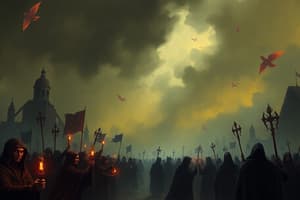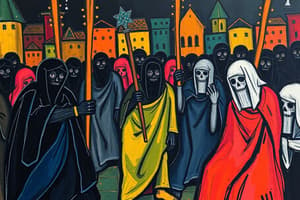Podcast
Questions and Answers
What impact did the Black Death have on labor in Florence?
What impact did the Black Death have on labor in Florence?
- Increased demand for labor due to population decline (correct)
- Increased unemployment due to overpopulation
- Decreased demand for goods and services
- Stabilization of wages across various professions
Which factor contributed to the influx of new knowledge during the Renaissance in Italy?
Which factor contributed to the influx of new knowledge during the Renaissance in Italy?
- Invention of the printing press
- Rise of Europe as a military power
- Expansion of European colonies overseas
- Fall of Constantinople and the migration of scholars from the East (correct)
How did attitudes towards the Church change during the Renaissance?
How did attitudes towards the Church change during the Renaissance?
- People became more devout and focused on religious rituals
- The Church gained increased authority over political matters
- People remained indifferent to the role of the Church
- People began to turn away from the Church and seek scientific explanations (correct)
What was one consequence of the Black Death on the economy of Florence?
What was one consequence of the Black Death on the economy of Florence?
What philosophical movement was significant during the Renaissance?
What philosophical movement was significant during the Renaissance?
What did the Crusades and the fall of Constantinople contribute to during the Renaissance?
What did the Crusades and the fall of Constantinople contribute to during the Renaissance?
How did Humanism differ from the traditional views of the Catholic Church?
How did Humanism differ from the traditional views of the Catholic Church?
What role did the printing press play during the Renaissance?
What role did the printing press play during the Renaissance?
What was one of the main criticisms of the Catholic Church during the Renaissance?
What was one of the main criticisms of the Catholic Church during the Renaissance?
Which of the following describes a key value of Humanism?
Which of the following describes a key value of Humanism?
What was a consequence of the reluctance to investigate new ideas during the medieval period?
What was a consequence of the reluctance to investigate new ideas during the medieval period?
Which group is credited with preserving translations of classical texts during the Renaissance?
Which group is credited with preserving translations of classical texts during the Renaissance?
What did Humanists encourage regarding the study of religion and science?
What did Humanists encourage regarding the study of religion and science?
Flashcards are hidden until you start studying
Study Notes
The Black Death and Its Impact
- The Black Death, a bubonic plague pandemic, ravaged Europe and Asia in the mid-14th century, claiming an estimated 75 to 200 million lives.
- The plague's impact on Florence in 1348 is particularly notable, as it reduced the city's population by 50-60% within just one year.
- The Black Death's devastating impact on the population resulted in several significant consequences:
- Fewer craftspeople created a higher demand for labor, driving up wages.
- This increased demand also stimulated the need for more goods and services.
- The Church's perceived failure to protect its followers during the pandemic led many to turn away from religious authority and seek answers in science.
The Rediscovery of Classical Knowledge
- The Crusades and the fall of Constantinople (modern-day Istanbul) facilitated the rediscovery of "lost" classical texts from Ancient Rome and Ancient Greece.
- Muslim and Arabic scholars, who had preserved their own translations of these works, brought them to Italy during the Renaissance era.
- Christians also contributed to the influx of these texts, bringing them back to Italy after their involvement in the Crusades.
- The rediscovery of these texts introduced new ideas in philosophy, mathematics, science, architecture, and engineering, sparking intellectual and cultural renewal.
Humanism and New Ways of Thinking
- Renaissance humanism emphasized the rediscovery and study of Ancient Greek and Roman culture and learning.
- Humanists believed in using these classical ideals to bring about new ideas and progress in the world.
- They encouraged critical thinking and placed humans at the center of their studies, rather than solely focusing on religion.
- The invention of the printing press in 1440 played a crucial role in spreading humanist ideas and facilitating the circulation of new knowledge.
Rejection of Traditional Church Authority
- During the medieval period, fear of Church influence, such as excommunication, discouraged exploration of new ideas.
- The Renaissance period witnessed increased criticism of the Church and its teachings.
- Humanists did not reject God, but their perspectives differed from those of the Church. They emphasized individual human potential and placed greater value on this-worldly achievements.
Catholic Values vs. Humanism
- Traditional Catholic values emphasized human sinfulness and encouraged individuals to focus on preparing for eternity.
- Humanism, in contrast, celebrated the individual and their capacity to create beauty and contribute intellectually to society.
- Humanism fostered a spirit of inquiry and encouraged individuals to make their own judgments about science, other cultures, and intellectual ideas.
Studying That Suits You
Use AI to generate personalized quizzes and flashcards to suit your learning preferences.




